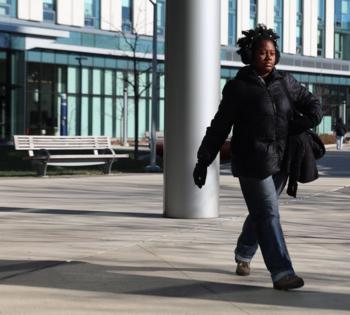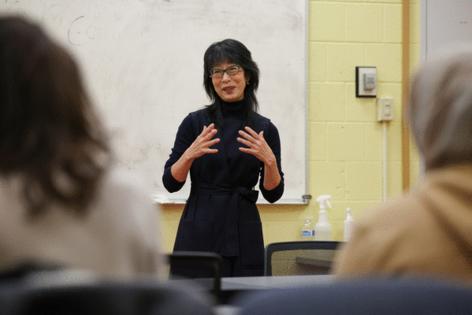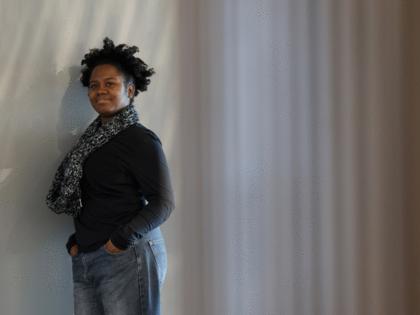Stressed students in Chicago can look to a new club inspired by a course on coping and resilience
Published in Lifestyles
CHICAGO — Kayla Daley started feeling “not the greatest” toward the end of her time in high school but didn’t necessarily know why. The feeling got worse after moving from the northwest suburbs to Chicago to begin college and was marked by depressive symptoms, loneliness and anxiety, she said.
“I mean, it was my first year of college, and I didn’t expect it to go the way I wanted it to, mentally,” Daley said. “I was new to the city and not used to the loudness, the crowds, and I never grew up in a diverse community.”
Daley said she was “in denial for a while” about what she was struggling with, which was mainly different levels of anxiety, and how she got to that point. A psychology course on resilience she took during the second semester of her junior year “opened up” her mindset and future.
“That class shifted my perspective to accept myself and understand certain pathways that got me to where I was, but also the fact that there is resilience at the end of that, which I think was a major takeaway,” Daley said. “It changed my life.”
Now a 21-year-old psychology major at the University of Illinois Chicago, Daley is a senior who hopes to cement her legacy on campus by launching a club to help other students find the resilience she was looking for when she started college by providing a space to work through stress.
Daley started the Behavioral Health Student Alliance as a parting gift to UIC and to incoming students who might wonder where they fit in and how to navigate their time in college, which can be major stressors on top of academics.
Even though starting a club was “very much out of my comfort zone,” Daley said, she wanted there to be a more intimate social outlet where students could connect and have space to talk to others dealing with similar stresses or struggles — and even successes.
“It’s very open to everyone, and it’s important for everyone to have a place to meet and talk and share ideas,” Daley said.
Julia Kim-Cohen will serve as the faculty adviser for the club and is the teacher behind the resilience course at UIC. Kim-Cohen, a senior lecturer in the department of psychology at UIC, is a full-time instructor teaching undergraduate courses in psychology and a clinical psychologist focused on the development of mental disorders and how people can become resilient in the face of adversity, stress and trauma.
“I’ve always been very interested in preventing mental disorders from developing and so that’s where the coping with stress comes in,” Kim-Cohen said.
She started teaching in a university setting in 2006 and was seeing “a ton of stress amongst students,” which she said got worse with the COVID-19 pandemic.
In fall 2020, Kim-Cohen said, she designed a course on resilience, which is “all about coping with stress and developing mental health and wellness even in the face of stress and all the really hard things that people have to deal with.”
“Over the course of my career, mental health has gotten worse, not better, amongst college students, so more than ever I think students need to learn skills for coping with stress and learning how to build their own resilience,” Kim-Cohen said.
She said she has been teaching the lecture-based course almost every semester for the past four years, with about 150 students each time. The curriculum at its core addresses a phenomenon across campuses everywhere: College students are subjected to unique stressors and can learn to deal with stress in healthy ways.
Some of the main teachings are the science of stress and trauma and then learning how to cope. Students get a weekly homework assignment that has them practice an “evidence-based behavior that can help relieve feelings of stress,” Kim-Cohen said, like helpful breathing techniques and certain types of music.
“Sleep is a really big one because college students in general don’t get all the sleep that they need and that can actually prevent them from coping well with stress,” Kim-Cohen said.
For Daley, these “resilience rewirements” were a big takeaway because some elements of daily life can go unappreciated or unnoticed, like sleep or exercise, when those are important for overall resilience.
Meditation, connecting with nature, gratitude journals and laughter are also examples of the practices students are encouraged to mindfully engage in and implement in their routines, Daley said.
Another major takeaway from the course is normalizing stress, Kim-Cohen said, as long as it is not overwhelming or severe.
“Without stress, we would not develop resilience or coping skills,” Kim-Cohen said. “Stress is a necessary part of life and every time we feel stress, it’s an opportunity to get stronger.”
Daley said the course on resilience is important because it doesn’t just look at the brain and behavior, but “how you can look within yourself.”
“We don’t take much time to sit down and really reflect on certain things in life and how our past shows in our present and what’s in our present can impact our future,” she said.
The most important concepts Daley said she learned in the course were adverse childhood experiences — events and experiences from the past that could still be affecting a person’s life — rethinking stress and understanding that a person’s own thoughts can be hurdles and induce stress.
“That was all very eye-opening because I have a huge issue with stress, and the class helped me gain a new perspective,” Daley said.
She said the teachings and techniques she picked up in the class are tools she will keep with her well beyond college. The club should be up and running by the start of spring, Daley said, with her serving as its first president. Information can be found next semester on the Behavioral Health Student Alliance’s Instagram account.
Daley said she hopes to also pass on some of the resilience learning to other students as they join the club. She has some ideas for what else she can implement but is “still figuring it out,” she said.
“The most important thing is I hope people feel secure and safe while gathering and, you know, finding yourself and finding others who are in the process of doing that,” she said.
©2024 Chicago Tribune. Visit at chicagotribune.com. Distributed by Tribune Content Agency, LLC.





























Comments